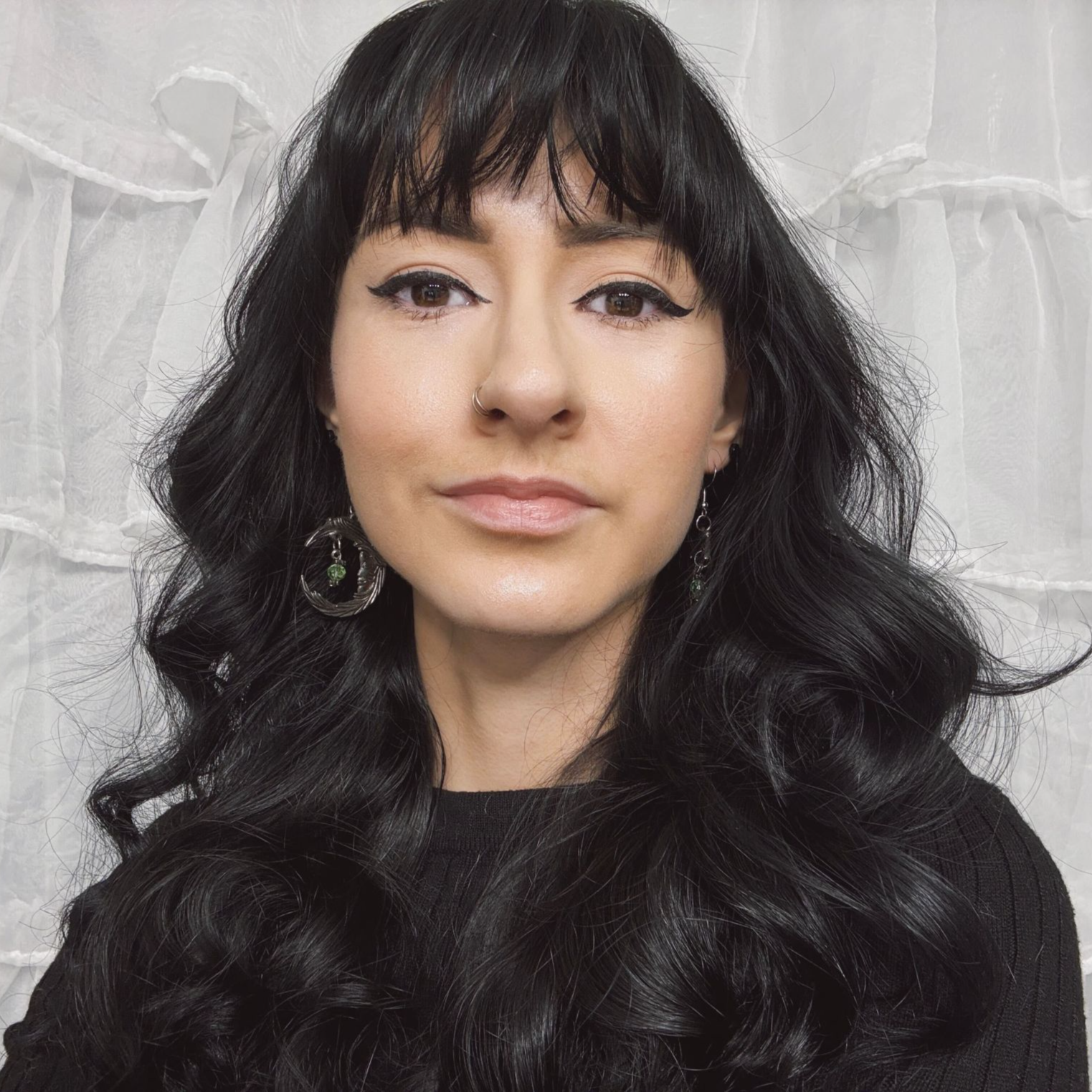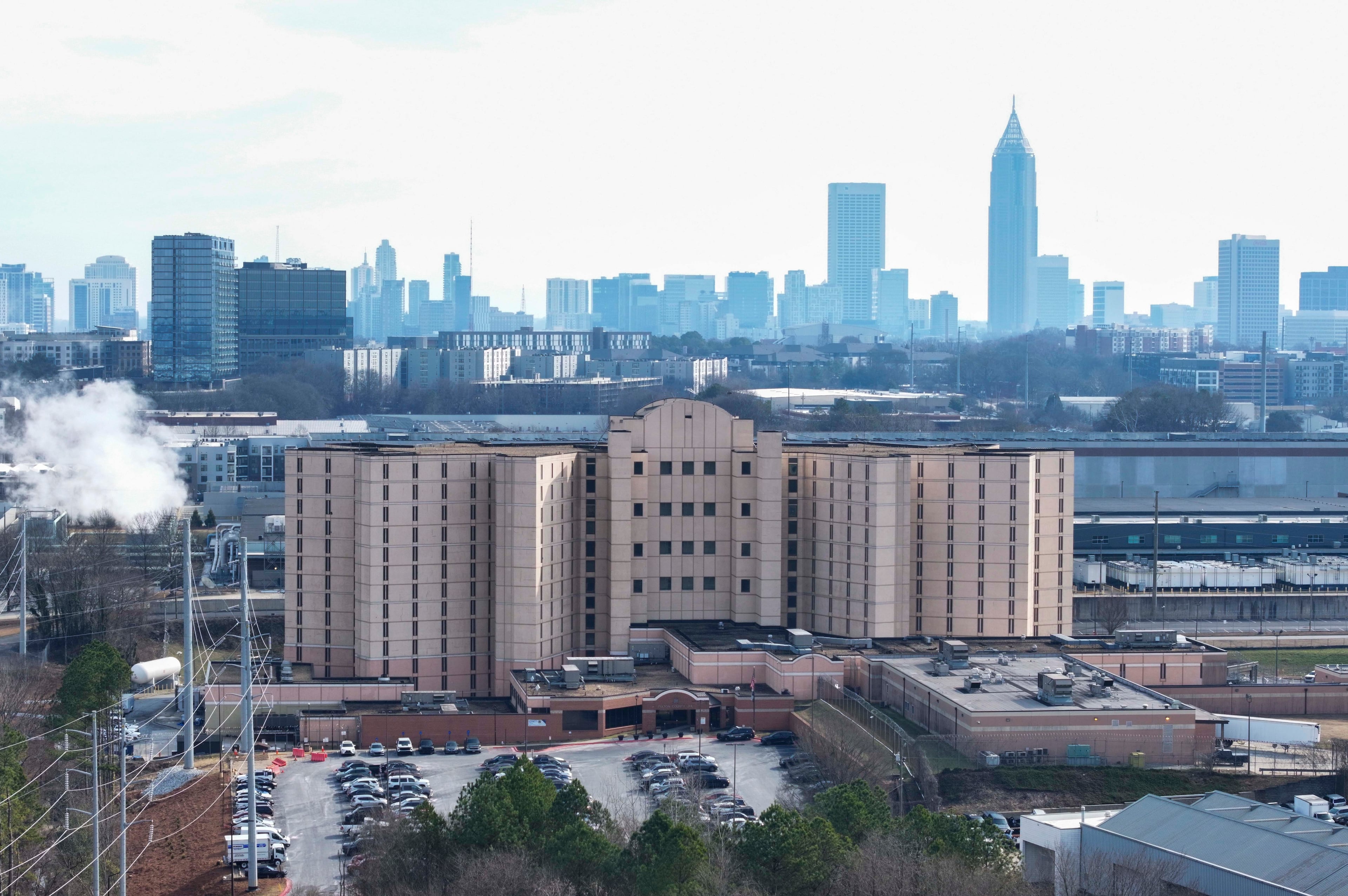Protesters, police back at Emory hours after arrests
After Thursday morning’s clashes between police and protesters at Emory University, law enforcement officers returned to the school in the evening as activists gathered at Emory’s Candler School of Theology building.
The group held signs and chanted “Free Palestine” and “From the river to the sea” as police moved in to guard the building.
Emory junior Caleb Bunch attended the Thursday morning demonstration and returned Thursday evening. The amount of police presence seemed unnecessary, he said.
“It’s a little alarming,” said Bunch, who said he attended both gatherings to support students who have been feeling oppressed on campus since the start of the Israel-Hamas war. On Thursday evening, he stood on the outskirts of the protest and watched a Georgia State Patrol trooper ride into the quad on a motorcycle.
“I don’t really understand why it’s necessary to have GSP be here especially riding in on motorcycle,” he said. “But I definitely think it’s important to show solidarity. For progress to actually happen, it does take uncomfortable situations like these.”
At least 23 people had been booked earlier in the day on charges of criminal trespass, obstruction of law enforcement officers or other charges, DeKalb jail records show.
“The ones that were arrested, there wasn’t anything peaceful about what was going on,” Emory Police Department Commander Thomas Manns told The Atlanta Journal-Constitution.
Two people were charged with simple battery against a law enforcement officer, according to jail records.
In a statement, Emory said protesters arrived about 7:40 a.m., pushed past campus police and “set up tents in an area where equipment and materials were staged for Commencement.”
Emory’s graduation is scheduled for May 13; the speaker will be Dr. Valerie Montgomery Rice, president and CEO of Morehouse School of Medicine.
Emory requested help from the Atlanta Police Department and Georgia State Patrol after campus police “issued multiple warnings at different intervals advising individuals in the encampment that they were trespassing on private property and instructing them to leave.”
One person not affiliated with Emory, attacked an officer and was subsequently tased, the statement said.
The state patrol said officers responding “were met with protestors who threw bottles and refused to leave.”
“During the encampment protest response, Troopers deployed pepper balls to control the unruly crowd but did not use tear gas,” the agency said, adding that any charges would be issued by the Emory Police Department.
Tara Doyle, a lecturer at Emory’s Candler School of Theology, said the use of force was unnecessary.
“I am so disappointed in this university,” she said. “It was … heavy-handed, unnecessary violence against our students.”
Sandy Springs City Council member and Emory alum Andy Bauman posted a note on social media in support of his alma mater.
“Peaceful demonstration is one thing, taking over the Quad by a group including nonaffiliated Emory outsiders, harassing and threatening Jewish students and disrupting the education that is supposed to be ongoing is another,” he wrote. “I back Emory on this.”
A smaller crowd gathered midday at Kennesaw State University; no one was taken into custody.
“I’ve only been here a few minutes and someone already called me a Jihadist,” said Ali Dabdoub, a Palestinian KSU student studying software engineering. He arrived late to the demonstration because he was taking an exam.
Carrying a Palestinian flag and wearing a black and white keffiyeh, Dabdoub said he was impressed by the turnout, not just on KSU’s campus, but at colleges across the country.
“Falastin hurrah,” he said in Arabic, meaning, free Palestine.
“I believe the world is waking up,” he said. “I know it’s going to happen. It’s just a matter of time.”
Dave Clark, a Jewish KSU student who is a member of the university’s Chabad and Hillel groups, said the pro-Palestinian demonstrators made him feel unsafe on campus.
Several of the pro-Palestinian students pushed back, saying they peacefully calling for an end to the bloodshed in Gaza.
Clark, a history major, criticized Israeli Prime Minister Benjamin Netanyahu and said he believes Israel’s offensive in Gaza is damaging the Jewish nation’s standing in the world.
“I don’t think it reads well,” Clark said, likening the conflict in Gaza to the U.S. wars in Vietnam and Iraq. “However, sometimes you gotta do what’s necessary to protect your people.”
Though they disagreed on Middle East policy, both Clark and Dabdoub were critical of Emory University’s handling of the protest on its campus.
“I don’t believe protesters should be arrested,” said Clark. “As much as I disagree with these people, as much as I think they want me dead, I think in America we shouldn’t arrest people (for protesting). It’s the First Amendment.”







































Several Georgia legislators criticized Emory’s response.
“The use of extreme anti-riot tactics by Georgia State Patrol, including tasers and gas, is a dangerous escalation to protests which were by all accounts peaceful and nonviolent,” said the letter, signed by Rep. Ruwa Romman, Sen. Josh McLaurin and other lawmakers.
Earlier this week, Gov. Brian Kemp said he wouldn’t tolerate disruptive demonstrations after pro-Palestinian protesters stopped traffic and blocked bridges in several cities, including Chicago, Miami and San Francisco.
“You know how I feel about people blocking bridges, airports and other things like we’re seeing around the country,” he said. “I said, ‘If they do that, lock their ass up.’”
Lt. Gov. Burt Jones also weighed in, telling the AJC, “We will not allow pro-terrorist radicals and liberal anarchists to invade Georgia’s campuses. These criminals have only one goal: disruption. These heinous acts of antisemitism seen across the country cannot continue. In Georgia, they will be stopped, and these criminals will be punished.”
Georgia Attorney General Chris Carr wrote in a social media post that he stood by Emory’s action to “protect the health and safety of Georgia’s students.”
“Nobody has the legal right to shut down our schools by camping out and making antisemitic threats,” Carr added.
Rallies and demonstrations have sprung up on college campuses across America since the war began Oct. 7 with Hamas’ attack on Israel that killed an estimated 1,200 Israelis and foreigners. More than 34,000 Palestinians have been killed during the conflict, according to Gaza’s Health Ministry, at least two-thirds of them women and children.
There are believed to be about 130 Israeli hostages still held in Gaza, of the roughly 240 initially taken by Hamas, according to CBS News.
Those protesting the war are demanding schools divest from companies with ties to Israel, while some Jewish students say the protests have veered into antisemitism and made them afraid to set foot on campus as graduation nears.
At New York University this week, police said 133 protesters were taken into custody, while more than 40 protesters were arrested Monday at an encampment at Yale University. Columbia University President Minouche Shafik set on Tuesday a midnight deadline to reach an agreement on clearing an encampment, then relaxed the deadline to Friday, avoiding confrontation.
At Emerson College in Boston, 108 people were arrested and four police officers injured at an encampment overnight, Boston police said.
Upon hearing of the clashes with police at Emory on Thursday, Georgia NAACP President Gerald Griggs said they are requesting a meeting with Emory’s president. The organization wants a “detailed understanding of events” that took place, including the reasoning behind the way the university responded, Griggs said in a statement.
The Georgia Chapter of the Council on American-Islamic Relations said in a statement, “Emory University and APD fully bear responsibility for the violence we are seeing at the Emory campus right now. Students and protesters must be allowed their full constitutional rights.”
The ACLU of Georgia also said it “is closely watching the current protests” and said “colleges and universities should be places where viewpoints, expression, debate and free speech are encouraged, not suppressed.”
While grappling with growing protests from coast to coast, schools have the added pressure of May commencement ceremonies.
Morehouse College’s announcement that President Joe Biden will speak at graduation on May 19 has sparked mixed reactions.
Morehouse students gathered Thursday evening, hours after the demonstrations on the Emory and Kennesaw State campuses.
”I saw videos of Columbia students getting arrested protesting. I see Harvard is now protesting, and now our own students (are) taking action,” said Morehouse junior Kenner Grant.
He feels that activism drives social movements.
“I just saw a picture that said, ‘We are never outnumbered, we’re just out-organized,’” Grant said.
— Staff writers Cassidy Alexander, Greg Bluestein and Jozsef Papp contributed to this article. Material from the Associated Press was also used.






